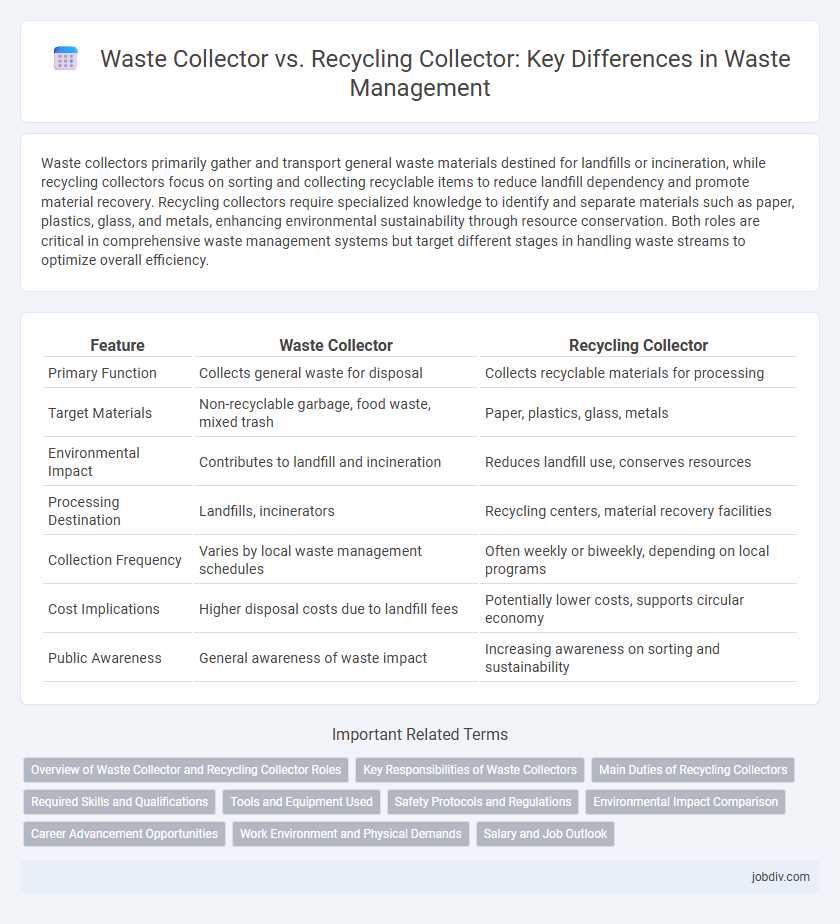Waste collectors primarily gather and transport general waste materials destined for landfills or incineration, while recycling collectors focus on sorting and collecting recyclable items to reduce landfill dependency and promote material recovery. Recycling collectors require specialized knowledge to identify and separate materials such as paper, plastics, glass, and metals, enhancing environmental sustainability through resource conservation. Both roles are critical in comprehensive waste management systems but target different stages in handling waste streams to optimize overall efficiency.
Table of Comparison
| Feature | Waste Collector | Recycling Collector |
|---|---|---|
| Primary Function | Collects general waste for disposal | Collects recyclable materials for processing |
| Target Materials | Non-recyclable garbage, food waste, mixed trash | Paper, plastics, glass, metals |
| Environmental Impact | Contributes to landfill and incineration | Reduces landfill use, conserves resources |
| Processing Destination | Landfills, incinerators | Recycling centers, material recovery facilities |
| Collection Frequency | Varies by local waste management schedules | Often weekly or biweekly, depending on local programs |
| Cost Implications | Higher disposal costs due to landfill fees | Potentially lower costs, supports circular economy |
| Public Awareness | General awareness of waste impact | Increasing awareness on sorting and sustainability |
Overview of Waste Collector and Recycling Collector Roles
Waste collectors primarily handle the collection and transportation of general waste from residential, commercial, and industrial sources to disposal sites such as landfills or incinerators. Recycling collectors specialize in gathering recyclable materials like paper, plastics, metals, and glass, ensuring these are processed separately to reduce landfill contributions and promote material recovery. Both roles are essential for maintaining urban sanitation and advancing sustainable waste management practices.
Key Responsibilities of Waste Collectors
Waste collectors are responsible for the efficient collection and transportation of municipal solid waste, ensuring proper containment and adherence to safety regulations during handling. They systematically pick up residential, commercial, and industrial waste, segregate non-recyclable materials, and maintain accurate records of collected refuse to support waste management logistics. Their role is critical in preventing environmental contamination and facilitating downstream waste processing and disposal.
Main Duties of Recycling Collectors
Recycling collectors specialize in gathering recyclable materials such as paper, plastics, metals, and glass from residential, commercial, and industrial sources, ensuring proper segregation at the collection point. Their main duties include identifying and separating recyclable waste accurately to prevent contamination, operating specialized vehicles equipped with compartments for different types of recyclables, and maintaining detailed records of collected materials for processing facilities. They also educate the community on correct recycling practices to enhance efficiency and reduce landfill waste, playing a critical role in sustainable waste management systems.
Required Skills and Qualifications
Waste collectors require physical stamina, knowledge of safe waste handling practices, and basic equipment operation skills to manage general refuse efficiently. Recycling collectors need a deeper understanding of recyclable materials, sorting techniques, and environmental regulations to ensure proper separation and processing. Both roles prioritize attention to detail, adherence to safety standards, and the ability to work outdoors in various weather conditions.
Tools and Equipment Used
Waste collectors typically use basic tools such as bins, garbage trucks, gloves, and protective clothing to collect and transport general waste, which includes non-recyclable materials. Recycling collectors employ specialized equipment like sorting machines, conveyor belts, and magnetic separators to efficiently separate and process recyclable materials such as paper, plastic, glass, and metals. Both roles often utilize compactors and balers to reduce the volume of waste and recyclables for easier handling and transportation.
Safety Protocols and Regulations
Waste collectors adhere to strict safety protocols that include the use of personal protective equipment (PPE) such as gloves, masks, and high-visibility clothing to minimize exposure to hazardous materials and prevent injuries. Recycling collectors follow specialized regulations that emphasize the separation of recyclable materials at the source to reduce contamination and promote efficient processing, often requiring training in handling specific items like e-waste or hazardous recyclables. Both roles are governed by occupational health and safety standards established by organizations like OSHA, ensuring compliance with local waste management laws and environmental protection guidelines.
Environmental Impact Comparison
Waste collectors primarily transport general refuse to landfills, which increases methane emissions and contributes to soil and water contamination. Recycling collectors focus on separating and processing materials like paper, plastics, and metals, reducing landfill use and conserving natural resources through material recovery. The environmental impact of recycling collectors is significantly lower, promoting a circular economy and decreasing greenhouse gas emissions compared to conventional waste collection.
Career Advancement Opportunities
Waste collectors mainly handle general waste disposal and often have limited career advancement options beyond supervisory roles. Recycling collectors specialize in sorting and processing recyclable materials, which opens pathways to specialized positions in environmental management and sustainability programs. Expertise in recycling technologies and environmental regulations significantly enhances career growth compared to general waste collection roles.
Work Environment and Physical Demands
Waste collectors typically work outdoors in all weather conditions, handling heavy bins and bags, which requires significant physical strength and endurance. Recycling collectors also work outdoors but often sort materials on-site, demanding attention to detail and repetitive motions that can lead to strain. Both roles involve lifting, bending, and prolonged standing, with recycling collectors facing additional challenges from separating and managing different recyclable materials.
Salary and Job Outlook
Waste collectors typically earn an average salary of $35,000 per year, with job growth projected at 4% through 2030, driven by urban waste management demands. Recycling collectors, earning slightly higher averages around $40,000 annually, experience faster job growth of 6% due to increasing environmental regulations and community recycling initiatives. Both roles require physical labor, but recycling collectors benefit from expanding sustainability efforts that enhance employment opportunities and wage prospects.
Waste Collector vs Recycling Collector Infographic

 jobdiv.com
jobdiv.com